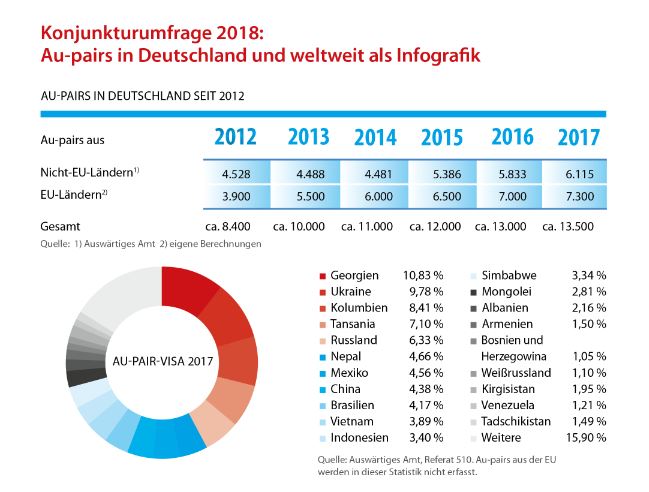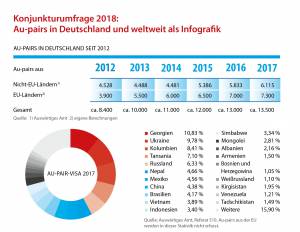New au pair survey: number of au pairs in Germany at an all-time high
New au pair survey: number of au pairs in Germany at an all-time high
In 2017, 13,500 au pairs came to work in Germany. In addition to au pairs from Eastern Europe and Asia, there has recently been a significant rise in the number of au pairs from South America. There has also been a visible shift in the target countries of German au pairs: Great Britain and the USA have lost some of their appeal.
Germany, on the other hand, has consistently met the expectations of foreign au pairs for years: In 2017, 13,500 foreign au pairs came to Germany.
Their number has been rising every year since 2012. This does not apply, however, for all countries with a traditionally high number of au pairs: Young Germans in Great Britain and in the USA have a keen sense for political changes. Various factors have an effect on young people’s choice of target country for an au pair stay: the needs of the host families, the popularity of the local language or the welcoming culture of the country in question. The survey “Au pairs in Germany and worldwide”, carried out by au pair insurer Dr. Walter, provides current data and information on au pairs and host families.
Countries of origin
Last year, the Federal Foreign Office granted more than 6,000 visas to au pairs from non-Eu countries. Where Georgia, Ukraine, Russia and Nepal have topped the list of au pairs’ countries of origin ever since 2010, this year saw the first South American country (Colombia) entering the top 3 sending countries of au pairs traveling to Germany. More than 7,000 au pairs came from European countries, although they often stayed for less than a year and used their stay, for example, to bridge the time between high school until the start of their studies.
Change in the travel behavior of German au pairs
Although more than 3,500 young Germans still went to the USA to work as an au pair in 2017, this represents a decrease of 13% compared to the previous year. As a result of the Brexit decision, a similar development can also be observed for the popularity of Great Britain among au pairs: British agencies report a sharp decrease of German applicants who seem to no longer feel as welcome as they used to. The overall duration of stay of German au pairs abroad has decreased as well. Where a majority of au pairs used to stay with their host family for 10-12 months, the duration of stay of most of them sank to 4-9 months in 2017.
More male au pairs
There is an ongoing trend of more young men working as an au pair. A growing number of host families put value on male parental figures for their children. At the same time, more and more young men see an au pair stay abroad as a challenging experience.
Less au pair agencies
In January 2017, there were 196 au pair agencies in Germany. One year later, in early 2018, this number has dropped to 161. Almost five percent of all agencies went out of business since the majority of au pairs are now sent by a few large (matching) agencies. This is a decrease of 18 percent.
Comprehensive source of data
Every year, the business survey “Au pairs in Germany and worldwide” provides current data and information on au pairs and host families. It is based on a representative survey among 56 au pair agencies and on talks with au pair experts. The business survey is carried out annually by insurance expert and IAPA member DR-WALTER Auslandsversicherungen and published by Calypso Verlag.
Click here to download the full survey (in German only) for free.





